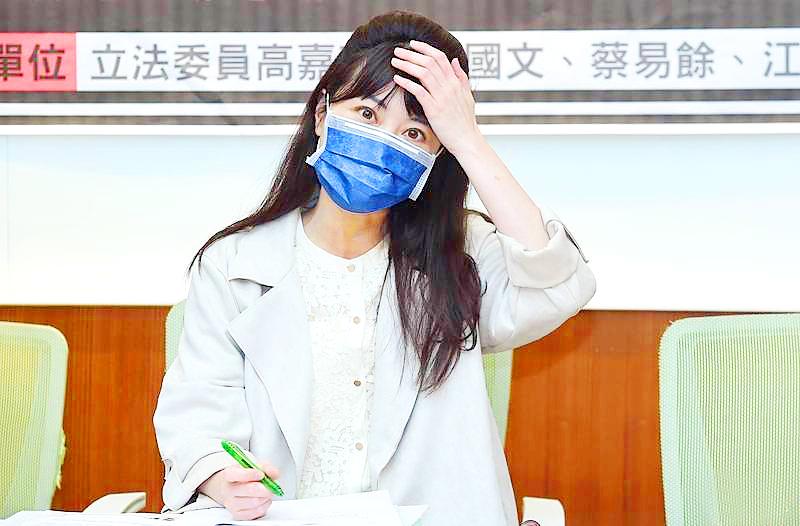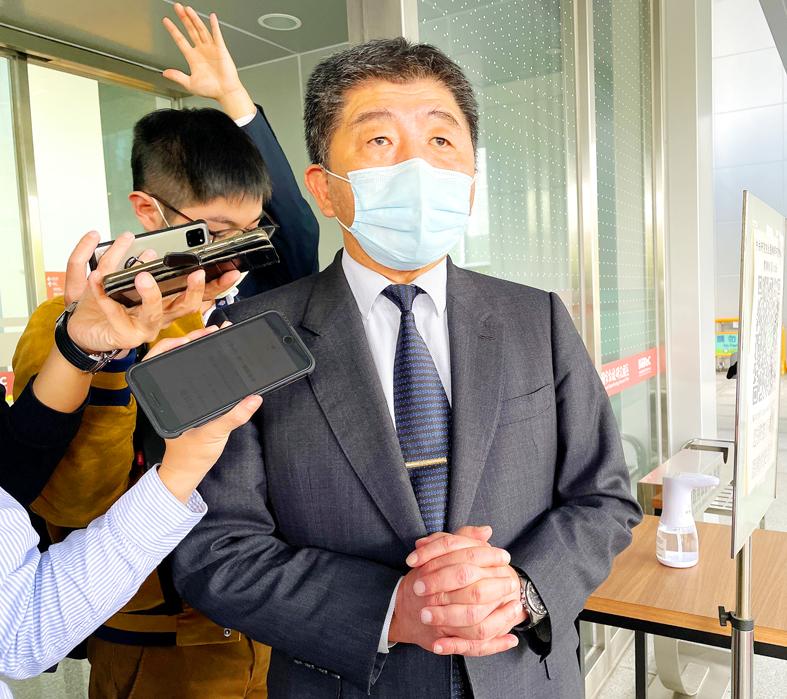A spokesperson for Democratic Progressive Party (DPP) Legislator Kao Chia-yu (高嘉瑜) yesterday thanked members of the public for their concern after a report alleging she had been abused by her partner, sparking outpourings of sympathy and condemnations of violence from officials.
Kao yesterday filed a report against her boyfriend with Taipei police, claiming he physically assaulted her during a recent altercation. The case was transferred to the New Taipei City Police Department, as the alleged incident occurred in Banciao District (板橋).
The New Taipei District Prosecutors’ Office said that its Crimes against Women and Children Division has started to collect evidence to determine whether to launch a full investigation.

Photo: Wang Ting-chuan, Taipei Times
A statement issued earlier in the day through the Legislative Yuan’s office said that Kao was preparing a response to the allegations, including relevant documentation.
“Chia-yu will bravely face the matter in the hopes of preventing another victim,” it said. “Thanks again to everyone for their concern.”
The Chinese-language Mirror Media early yesterday published a report alleging that Kao was beaten by her partner last month over messages from a former boyfriend on her phone.

Photo: CNA
He allegedly seized her phone and kept her in a hotel for two days, after which Kao sought medical attention for her injuries at National Taiwan University Hospital, it reported.
Photographs published by the magazine showed bruises on Kao’s neck, wrists and hands.
Public officials condemned the violence, while extending their sympathy to Kao.
In Taipei, the Department of Social Welfare said it is aware of the allegations, but urged confidentiality for those involved, while Taipei Mayor Ko Wen-je (柯文哲) condemned violence of any kind.
The department also urged victims of domestic violence to call the 113 Children and Women Protection Hotline or 110 emergency number.
Presidential Office spokesman Xavier Chang (張惇涵) said that President Tsai Ing-wen (蔡英文) had instructed the office to call Kao to convey her concern.
The office “strongly condemns violence and would support Kao if she decides to take legal action,” he added.
Chang also denied claims by Kao’s partner that he is a national security adviser.
Legislative Speaker You Si-kun (游錫堃) said he feels for Kao and wished her a speedy recovery.
Minister of Health and Welfare Chen Shih-chung (陳時中) also reiterated the government’s “zero-tolerance policy” toward violence between intimate partners.
Whether incidents get reported depends on a number of factors, he said, adding that the issue is not so simple it can be solved by a single policy.
Regardless, violence between intimate partners should not be treated with leniency or swept under the rug, Chen added.
Research has shown that it is hard to stop domestic violence once it begins, Chen said.
According to a Ministry of Health and Welfare survey, one in five women in Taiwan are subject to violence at the hands of an intimate partner.
Psychological abuse is the most common, followed by physical abuse, the ministry said yesterday.
A popular figure in the DPP, Kao rocketed into the public eye after becoming the youngest-ever member of the National Assembly in 2005.
She went on to serve as a Taipei City Councilor from 2010 to last year, when she was elected to the Legislative Yuan to represent Taipei’s Neihu (內湖) and Nangang (南港) districts.

MAKING WAVES: China’s maritime militia could become a nontraditional threat in war, clogging up shipping lanes to prevent US or Japanese intervention, a report said About 1,900 Chinese ships flying flags of convenience and fishing vessels that participated in China’s military exercises around Taiwan last month and in January last year have been listed for monitoring, Coast Guard Administration (CGA) Deputy Director-General Hsieh Ching-chin (謝慶欽) said yesterday. Following amendments to the Commercial Port Act (商港法) and the Law of Ships (船舶法) last month, the CGA can designate possible berthing areas or deny ports of call for vessels suspected of loitering around areas where undersea cables can be accessed, Oceans Affairs Council Minister Kuan Bi-ling (管碧玲) said. The list of suspected ships, originally 300, had risen to about

DAREDEVIL: Honnold said it had always been a dream of his to climb Taipei 101, while a Netflix producer said the skyscraper was ‘a real icon of this country’ US climber Alex Honnold yesterday took on Taiwan’s tallest building, becoming the first person to scale Taipei 101 without a rope, harness or safety net. Hundreds of spectators gathered at the base of the 101-story skyscraper to watch Honnold, 40, embark on his daredevil feat, which was also broadcast live on Netflix. Dressed in a red T-shirt and yellow custom-made climbing shoes, Honnold swiftly moved up the southeast face of the glass and steel building. At one point, he stepped onto a platform midway up to wave down at fans and onlookers who were taking photos. People watching from inside

Japan’s strategic alliance with the US would collapse if Tokyo were to turn away from a conflict in Taiwan, Japanese Prime Minister Sanae Takaichi said yesterday, but distanced herself from previous comments that suggested a possible military response in such an event. Takaichi expressed her latest views on a nationally broadcast TV program late on Monday, where an opposition party leader criticized her for igniting tensions with China with the earlier remarks. Ties between Japan and China have sunk to the worst level in years after Takaichi said in November that a hypothetical Chinese attack on Taiwan could bring about a Japanese

The WHO ignored early COVID-19 warnings from Taiwan, US Deputy Secretary of Health and Human Services Jim O’Neill said on Friday, as part of justification for Washington withdrawing from the global health body. US Secretary of State Marco Rubio on Thursday said that the US was pulling out of the UN agency, as it failed to fulfill its responsibilities during the COVID-19 pandemic. The WHO “ignored early COVID warnings from Taiwan in 2019 by pretending Taiwan did not exist, O’Neill wrote on X on Friday, Taiwan time. “It ignored rigorous science and promoted lockdowns.” The US will “continue international coordination on infectious